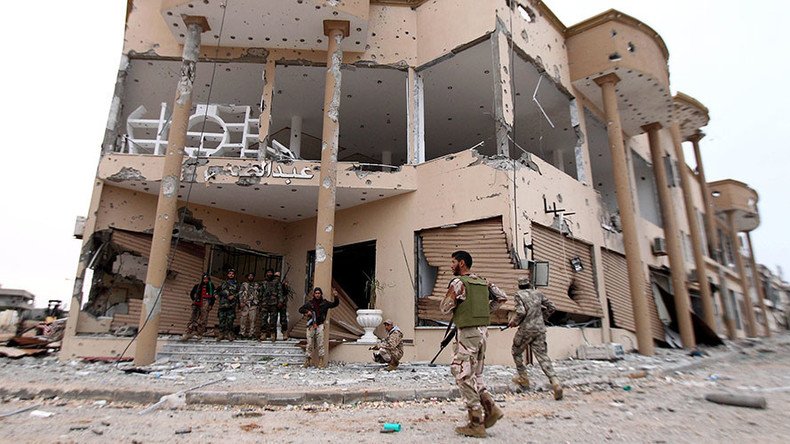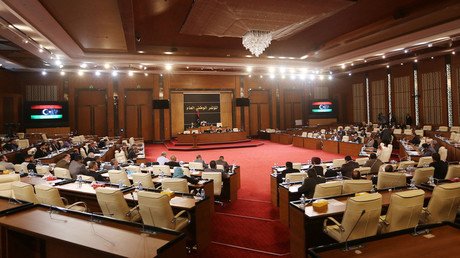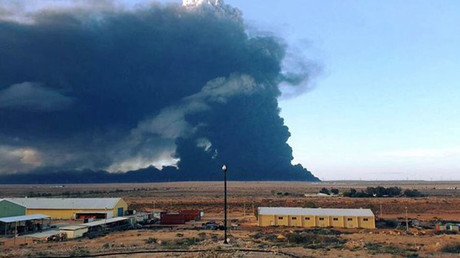Crimes against humanity and war crimes were committed by all sides of the Libyan conflict last year, Human Rights Watch (HRW) said in its World Report 2016. While rival governments compete for legitimacy, Islamic State is making gains in the country.
“Civilians in Libya are bearing the brunt of armed conflicts and a failed political transition that have crushed any semblance of the rule of law,” Eric Goldstein, deputy Middle East and North Africa director at Human Rights Watch, told the watchdog’s website.
The battle for power between two rival governments in al-Bayda and Tripoli has led to 400,000 people being displaced, an increase in kidnappings for ransom, and enforced disappearances, as well as the rise of radical groups, including Islamic State (IS, formerly ISIS/ISIL), HRW said in the report.
The country has also become a transit point for “tens of thousands of migrants, refugees, and asylum seekers” as they cross the Mediterranean for Europe.
Both of Libya’s competing governments and various armed groups are holding thousands of detainees in long-term arbitrary detention, according to HRW.
The people are being held for lengthy terms – sometimes reaching up to four years – without any charges being pressed against them.
The torture of detainees, including children, is also wide spread, the report said, stressing that the above mentioned violations amount to crimes against humanity.
The warring sides in Libya were also guilty of war crimes, including arbitrary arrests, torture, and shelling of civilian areas, the watchdog said.
Internationally prohibited cluster munitions and antipersonnel landmines were also used by “some forces” in Libya, it added.
The World Report 2016 also emphasized the extended presence of Islamic State in the country last year.
The jihadists have taken control the coastal city of Sirte and established “its own brutal form of public administration and justice” there, it said.
According to HRW, IS has taken responsibility for a number of attacks in Libya, including in the cities of Tripoli, Derna, and al-Qubba.
The group has staged public executions of its opponents and non-Muslims, who it considers apostates. Twenty-one mostly Egyptian Coptic Christians and 30 Ethiopian Christians were put to death in early 2015.
Due to the breakdown in Libya’s justice system, “there is little prospect for domestic accountability” for the perpetrators, the report said.
However, HRW noted that neither the International Criminal Court (ICC), nor the UN Security Council, have taken steps to punish those responsible for violating international law in Libya.
Due to the breakdown in Libya’s justice system, “there is little prospect for domestic accountability” for the perpetrators, the report said.
However, HRW noted that neither the International Criminal Court (ICC), nor the UN Security Council, have taken steps to punish those responsible for violating international law in Libya.
The country has been in turmoil since 2011, when a NATO air campaign helped the country’s opposition topple long-time ruler Muammar Gaddafi.
Also on Wednesday, a report by the US security consulting firm, Soufan Group, warned that Libya could soon become the new destination of choice for extremists due to its ungoverned hinterlands, weak borders, and vast oil reserves.
The paper stressed that Islamic State and Al-Qaeda already “thrive” in the country, “utilizing Libya as a safe haven from which to launch operations against neighboring countries.”
READ MORE: 1,000 crack British troops deployed to Libyan oil fields to ‘halt the advance of ISIS’
“A failed state in Libya could be disastrous for North Africa and Europe as well as the broader international community,” it stressed.
Having been forced out of Syria and Iraq by local forces and “international military coalitions,” IS and Al-Qaeda are moving into Libya, the report said.
Russia has been carrying out an air campaign against terrorists in Syria since September 30, 2015 at the request of President Bashar Assad.
A US-led coalition has been bombing targets in Syria and Iraq since 2014. Their efforts in Syria, however, were neither invited nor approved by the Syrian authorities.



